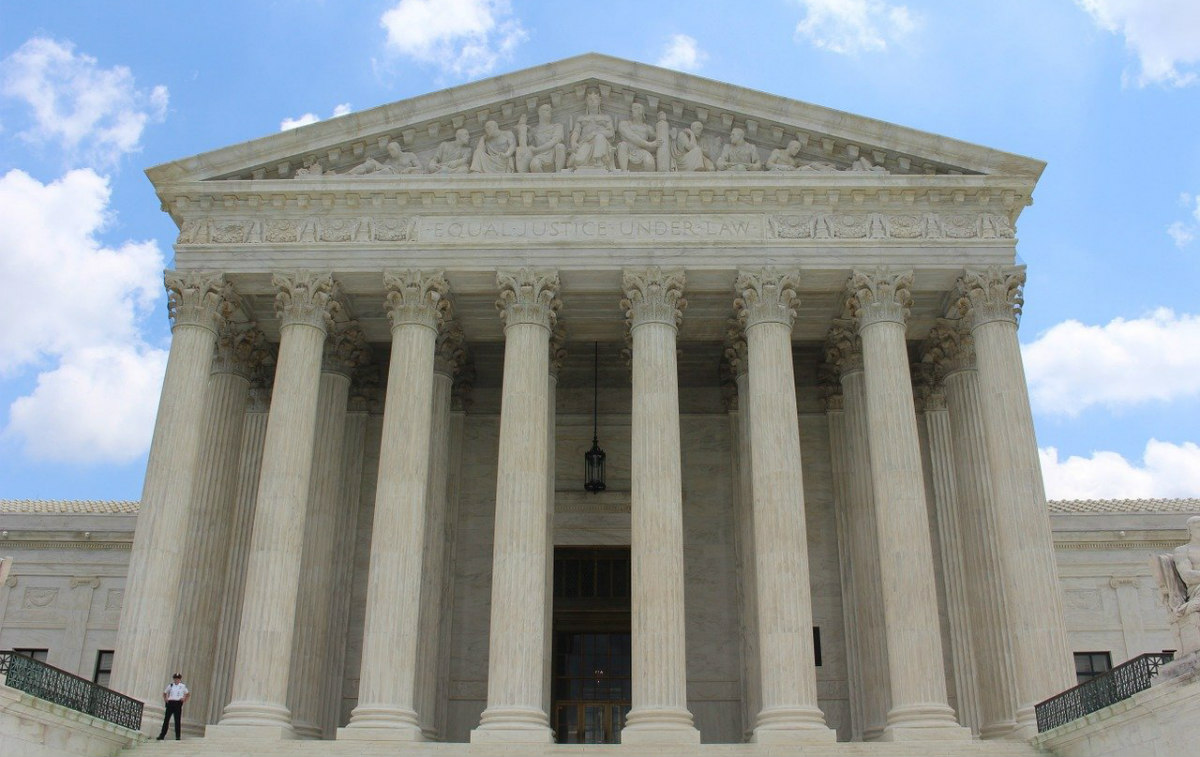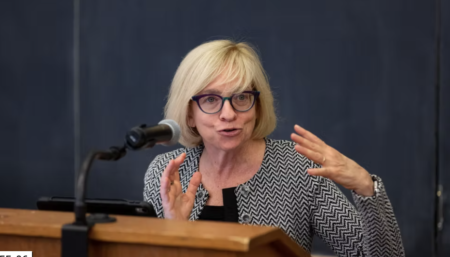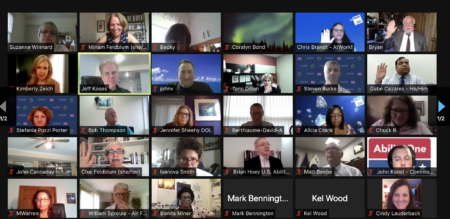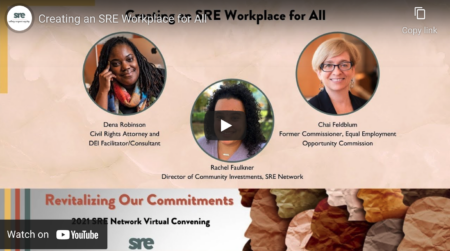Monday, June 15, 2020 is going to live in our memory for a very long time. On that day, the Supreme Court handed down the Bostock opinion, ruling that discrimination on the basis of sexual orientation and gender identity are forms of sex discrimination.
Seeking protection for LGBT people from discrimination has been a major part of my professional work over the past three decades, through legislative means (starting for me in 1992) and particularly over the past decade, through the vehicle of existing sex discrimination law to achieve that goal. I want to thank everyone who has reached out to me with congratulations and love. Thank you, thank you!
But as I got those thanks, I realized that what I really wanted to do was to write about the nearly 50 year community journey that brought us to this moment and to shout out the names of some people who may not be well-known but who labored along this journey that culminated in the Court’s opinion in Bostock. Some of these names will be familiar (they are deservedly celebrated already), but others will not be.
Caveat: I thought this piece would be just a few paragraphs in a Facebook post, but it has grown into an article on Medium. I am now writing this with some trepidation because I know there will be omissions. This is not a list of everyone who has worked on LGBT rights generally. Thank goodness for all of you! This is also not a comprehensive review of every single federal and state case that was part of the journey to this moment. (I will write that law review article or book, I promise.)
This is just a post to begin to acknowledge and thank the many people who helped advance the legal argument that discrimination on the basis of sexual orientation and gender identity are forms of sex discrimination. If there are other people who should be acknowledged and thanked on that front, would you put them in a comment? We need to know them all.
First, there were the brave individuals who reached out to the U.S. Equal Employment Opportunity Commission (EEOC) shortly after Title VII went into effect. This included activists like Del Martin, Joel Starkey, and Frank Kameny, who pushed the EEOC to recognize the plain meaning of the law early on and some of the EEOC staff in regional offices who were open to that idea. Thank you to Chanakya Sethi, Angela Cai and Rakesh Kilaru for the amazing historian’s amicus brief that found this history and brought it to the Court’s attention. These early fighters also include the gay and transgender people who filed claims with the EEOC in the 1970s and pursued litigation, expecting the plain language of a sex discrimination law to cover them, only to be slammed down when the EEOC and the courts concluded there was no way Congress could have intended to provide employment protection to LGBT people. Many of these people we know only by their initials in early published EEOC determinations, because statutory prohibitions required confidentiality. One of them, Paula Grossman, we know only because the EEOC decision was appended to the court complaint. Others, such as Ramona Holloway and Karen Ulane (who won in the district court before getting reversed on appeal) we know thanks to their dedicated efforts to pursue their legal rights through the courts. Aimee Stephens, Gerald Lynn Bostock, and Donald Zarda are the heirs of these early fighters, as are the many other LGBT people who brought claims in court under Title VII over the years. How wonderful that the names of these fighters can be public and we can celebrate them. We all mourn that neither Aimee nor Donald got to see the wonderful outcome of their efforts.
Second, there were the legal scholars, such as Sylvia Law, Mark Fajer, Andrew Koppelman, Francisco Valdes, Ruth Colker, Katherine Bartlett, Mary Anne Case, Samuel Marcosson, among others, who had the insight to see the law for what it meant and made the case for re-evaluating the caselaw on this issue. The article I wrote in 2000 drew on that scholarship to make the case that gender identity should be added to the Employment Non-Discrimination Act because both sexual orientation and gender identity should have been recognized by the courts as covered by Title VII, and the only reason we needed a new federal law for LGB people was because the courts had failed to do so. If that was the case, then there was no reason not to add gender identity as well. Thanks to Shannon Minter from NCLR and Jennifer Levi from GLAD, Riki Wilchins from GenderPAC and many others, who educated me throughout the late 1990s on gender identity issues to get me to the right place on this issue.
Third, the wonderful EEOC people! As a longer exposition of the cases will make clear, there had been a steadily growing body of case law since the Supreme Court’s 1989 decision in Price Waterhouse that used a gender stereotyping theory to protect transgender people in many situations and also to protect LGB people who were gender nonconforming (in appearance or mannerisms) in certain situations. (See below for a recounting of some of those cases.) But the courts across the country were practically uniform in stating that sexual orientation was not covered under Title VII as a prohibited form of sex discrimination.
The EEOC changed that legal landscape. The EEOC’s decisions, starting in 2011 and culminating in 2015, reinvigorated the argument that sexual orientation was inherently a form of sex discrimination. EEOC based its rulings on the argument that discrimination based on sexual orientation and gender identity inherently takes sex into account in a manner that violates the law (this was ultimately the argument that the Supreme Court adopted in Bostock), as well as an association argument that several lower courts accepted in recent years; and a robust gender stereotyping argument — that every LGB person necessarily violates a core gender stereotype (that they should be sexually attracted to a person of the opposite sex), regardless of whether they conform to gender norms in their presentation or mannerisms.
There are many people at the EEOC, from 2010 until now, who were indispensable in helping to change this legal landscape. First, all of these rulings were issued in the context of decisions in claims brought by federal employees and applicants for federal jobs. The EEOC’s Office of Federal Operations, headed by Carlton Hadden and with amazing attorneys, is the office responding for handling thousands of claims of discrimination and advising federal EEO office on complying with employment non-discrimination. I am grateful for all the leaders and attorneys in that office. In particular, I want to thank Melissa Brand who worked on the Verretto case issued by the EEOC in 2011. That was the first case to extend protection to LGB people under the robust gender stereotyping theory described above, thus enabling LGB people to start bringing charges to the EEOC starting as early as 2012.
With regard to the EEOC’s decision in Macy in 2012 (holding that gender identity discrimination is a form of sex discrimination and ensuring that transgender people could bring charges to the EEOC), Baldwin in 2015 (holding in an expansive and detailed decision that sexual orientation discrimination is a form of sex discrimination), and Lusardi in 2015 (holding that an employer must permit a transgender person to use the bathroom and locker room consistent with their gender identity):
Huge thanks go to Daniel Vail and Eric Harrington, attorneys from the EEOC’s General Counsel office who served details in my office and were instrumental in the writing of Macy in 2012 and huge thanks to Pierce Blue, who was the lead lawyer in my office who worked on both the Baldwin and Lusardi decisions in 2015. Special thanks go to Sharon Masling who was there throughout that journey, working on both substance and process. Steven Zanowic was my guru on all things federal sector, and Anupa Iyer, Sara Fernandez and Mia Ives-Rublee kept the office going through thick and thin. Special thanks go to General Counsel David Lopez and his attorneys, in particular, Justin Mulaire, who brought the first amicus brief to the Commission in a gender identity case for an affirmative vote, even prior to the Commission’s Macy decision. I also want to thank Sharon Alexander, Antoinette Eates, and Ray Peeler who served in the Office of the Chair at EEOC, Jim Paretti from Commissioner Vicki Lipnic’s office, Eduardo Juarez and Jennifer Goldstein from the Office of General Counsel, and Peggy Mastroianni and Jeanne Goldberg from the Office of Legal Counsel, for all of their assistance and hard work.
Thank you, thank you to all the EEOC Commissioners and Chairs from 2010 until now who voted for (or supported the results of) the decisions that discrimination on the basis of sexual orientation and gender identity is inherently a form of sex discrimination: Jacqueline Berrien, Jenny Yang, Charlotte Burrows and Victoria Lipnic. Thank you for recognizing this elephant and knowing that it didn’t come out of a mousehole.
Finally, none of this would have been possible without the efforts of the advocates who filed and argued cases over so many years. As I said, this is not the full exposition of the legal developments. But a few highlights:
We have Jennifer Levi from GLAD to thank for bringing the first case establishing protection for a transgender woman under a sex discrimination law, based on a gender stereotyping theory post-Price Waterhouse. We have Jimmie L. Smith (plaintiff) and Randi A. Barnabee (lawyer), who brought the first employment law case finding protection for a transgender person in an employment case under a gender stereotyping theory. We have Vandy Beth Glenn (plaintiff) and Greg Nevins and the Lambda team who brought a case in which the Eleventh Circuit in 2011 ruled that gender identity discrimination was a form of sex discrimination under a gender stereotyping theory. We have Stephen Centola (plaintiff) and Scott A. Lathrop (lawyer) who received a groundbreaking decision in 2002 from Judge Nancy Gertner finding that discrimination based on sexual orientation is often, if not always, discrimination based on sex using gender stereotypes. Elizabeth Heller (plaintiff) and Craig A. Crispin and Shelley Russell (lawyers), secured a similar decision from Judge Robert Jones just a few months later. These decisions advanced LGBT protections using the Price Waterhouse gender stereotyping theory.
On the textualist argument side — We have the plaintiffs in Baehr v. Lewin (Ninia Baehr, Genora Daniel, Tammy Rodriguez, Antoniette Pregil, Pat Lagon and Joseph Melilio) and their lawyer (Daniel Foley) and their amicus lawyers (Kirk Cashmere and Evan Wolfson from Lambda Legal, and Bill Rubenstein, Ruth Harlow, and Matt Coles from the ACLU) to thank for the decision from the Supreme Court of Hawaii, led by Chief Justice Ronald Moon, acknowledging in 1993 that a prohibition on allowing same-sex couples to marry was a sex-based classification. While there was not extensive exposition of this argument in the opinion — it said it!
We have Sharon McGowan from the ACLU LGBT Rights Project to thank for getting a great decision from Judge James Robertson in the Schrorer case, setting out for the first time the textualist argument for covering gender identity discrimination as a form of sex discrimination. And we have Michael Hall (plaintiff) and Lisa Lou Gogal, Cleveland Stockmeyer, and Duncan Turner (lawyers) who secured the first textualist win for sexual orientation discrimination under Title VII from Judge Ricardo Martinez (with the assist of a great amicus filing from Greg Nevins, Jenny Pizer, Jennifer Divine, and Tara Borelli representing Lambda Legal) in Hall v. BNSF.
Finally, we come to the advocates who worked on the more recent cases as they moved through the courts. I will be forever grateful to the exceptional attorneys in EEOC’s Office of General Counsel, led by David Lopez, who were counsel in many of the cases that laid the foundation for this decision. Shout-outs here to Gail Coleman, Anna Noel Occhialino, Jennifer Goldstein and Jeremy Horowitz. You all did amazing work! Greg Nevins from Lambda Legal was an early believer in the textualist argument and worked tirelessly to advance it. He was often a balm to my soul. Jenny Pizer from Lambda is an amazing lawyer and colleague, both on this issue and others. Shannon Minter and Jennifer Levi continued to be major supporters, as was James Esseks and Josh Block. We owe thanks to Jillian Weiss for her dogged advocacy for her transgender clients; to Dana Beyer for spreading the word widely about the import of the early EEOC cases in 2011 and 2012, the Verretto and Castello duo; and to Mara Keisling, Lisa Mottet and Harper Jean Tobin for lots of work along the way.
Finally, of course, we have the advocates of record in the Supreme Court cases that came down on Monday. Here, we have now come to people whose names are deservedly known and celebrated. They include Gabriel Arkles, Chase Strangio, Ria Tabacco Mar, James Esseks, Louise Melling, Jennesa Calvo-Friedman, Jay Kaplan, Daniel Korobkin, Elizabeth Gill, and John Knight (for Aimee Stephens), Gregory Antollino (for Donald Zarda) and Brian J. Sutherland (for Gerald Bostock). They also include the hundreds of lawyers who worked on amicus briefs, Jon Davidson who organized the amicus briefs, and Pam Karlan and David Cole, who not only wrote briefs but argued eloquently for our community.
Robert Raben, Mark Agrast, Michael Iskowitz, Daniel Zingale, Winnie Stachelberg — ok, this list could go on forever! — I just want to acknowledge all of our years working together on ENDA, starting in 1992. How sweet it is to have a victory that is so much more encompassing than anything we could have dreamed of back then.
Nan Hunter — you’re in a category of thanks all your own. The movement owes so much to you, as do I.
I hope this piece has been worth it to those reading it. It truly started out as just a few paragraphs. Having gotten a lot of credit (which I am totally happy to get for the part I played in this journey while at the EEOC), I wanted to expand that acknowledgement out to others who have helped push the sex discrimination argument. It’s been a long march to justice — and we are still moving on!




